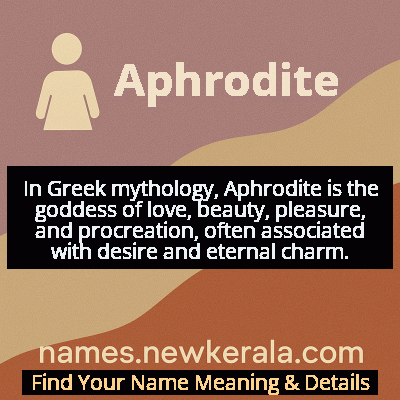Aphrodite Name Meaning & Details
Origin, Popularity, Numerology Analysis & Name Meaning of Aphrodite
Discover the origin, meaning, and cultural significance of the name APHRODITE. Delve into its historical roots and explore the lasting impact it has had on communities and traditions.
Name
Aphrodite
Gender
Female
Origin
Greek
Lucky Number
6
Meaning of the Name - Aphrodite
In Greek mythology, Aphrodite is the goddess of love, beauty, pleasure, and procreation, often associated with desire and eternal charm.
Aphrodite - Complete Numerology Analysis
Your Numerology Number
Based on Pythagorean Numerology System
Ruling Planet
Venus
Positive Nature
Harmonious, responsible, caring, and artistic.
Negative Traits
Overly idealistic, superficial, possessive, or jealous.
Lucky Colours
Pink, turquoise.
Lucky Days
Friday.
Lucky Stones
Diamond, turquoise.
Harmony Numbers
2, 3, 9.
Best Suited Professions
Artists, musicians, teachers, healthcare workers.
What People Like About You
Warmth, nurturing nature, artistic flair.
Famous People Named Aphrodite
Aphrodite (Mythological)
Greek Goddess
Primary deity of love, beauty, and fertility in Greek pantheon
Aphrodite Jones
True Crime Author
Bestselling author and television producer specializing in crime investigations
Aphrodite's Child
Music Band
Internationally successful Greek progressive rock band active 1967-1972
Name Variations & International Equivalents
Click on blue names to explore their detailed meanings. Gray names with will be available soon.
Cultural & Historical Significance
Extended Personality Analysis
The name Aphrodite carries strong personality associations derived from its mythological origins. Those bearing this name are often expected to embody qualities of charm, social grace, and emotional intelligence. They tend to be natural relationship-builders with an innate understanding of human connection and attraction. Like the goddess who could persuade both gods and mortals, Aphrodite-named individuals often possess persuasive abilities and diplomatic skills. Their emotional nature tends toward passion and intensity, with deep capacities for love and affection, though this can sometimes manifest as jealousy or emotional volatility. Creatively inclined, they often have strong aesthetic sensibilities and may excel in artistic pursuits. The modern Aphrodite personality balances the mythological attributes—combining the goddess's confidence and allure with contemporary values of emotional intelligence and relationship-building. While the name suggests beauty and charm, it also implies strength—the power to influence through emotional connection rather than force.
Modern Usage & Popularity
In contemporary naming practices, Aphrodite occupies a unique position as a powerful mythological name that remains relatively uncommon. Its usage is primarily concentrated among families of Greek heritage, where it maintains cultural significance, though it has gained some international appeal among parents seeking distinctive classical names. The name has never achieved mainstream popularity in English-speaking countries, consistently ranking outside the top 1000 names in the United States. However, it benefits from current trends favoring mythological and goddess names, alongside rising interest in classical education and historical names. Modern usage often involves shortening to nicknames like 'Aphra,' 'Dite,' or 'Rody,' making the imposing full name more accessible for daily use. The name's strong feminine associations and beautiful phonetic qualities continue to attract parents looking for names that combine historical depth with positive connotations of love and beauty, though its grandeur prevents it from becoming overly common.
Symbolic & Spiritual Meanings
Aphrodite's symbolic significance extends far beyond her mythological role as love goddess. She represents the fundamental human experiences of desire, attraction, and connection—the forces that bind individuals and communities. Her birth from sea foam symbolizes creation emerging from chaos, making her an emblem of beauty and order arising from turbulent beginnings. The dove and sparrow sacred to her represent peace and fertility, while the rose symbolizes both beauty's pleasure and its pain (thorns). Modern symbolic interpretations view Aphrodite as representing the integration of physical and spiritual love, the celebration of the body and senses as sacred, and the power of attraction as a creative force. In psychological terms, she embodies the 'Aphrodite consciousness'—an awareness of beauty, relationship, and the transformative potential of love. Her enduring symbolism speaks to universal human experiences of connection, creativity, and the pursuit of beauty in all aspects of life.

